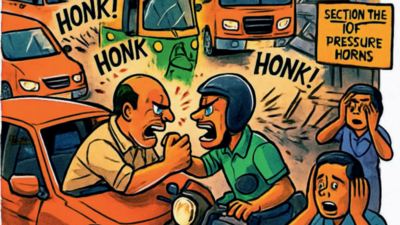ARTICLE AD BOX

NEW DELHI: On July 27, a group of seven-eight individuals allegedly attacked two men with beer bottles and stones in Sector 10, Dwarka. Two days earlier, a shooting took place near Ajmeri Gate in central Delhi.
On the same day, a man was beaten up by a group in southwest Delhi's Munirka. In each case, the conflict was reportedly triggered by excessive honking. It is a big concern in the city, highlighted by a 6% rise this year in the number of people caught using pressure horns.Experts point out that using the motor car horn not only involves noise but is increasingly symbolic of insult and anger. People irritated by honking engage in heated confrontations and today there often are violent outcomes on the roads.
According to Delhi Police data, 1,651 challans were issued for the use of pressure horns up to July this year compared with 1,560 in the same period last year. The data also revealed that 57 people were fined for unnecessary honking or honking in silence zones up to July this year, nearly double the 28 cases in the same period last year.Police said that no-honking zones, such as areas near schools and hospitals, are under constant monitoring.
Enforcement teams act against individuals using modified or pressure horns in these sensitive areas. Under Section 194F of the Motor Vehicles Act, any individual who misuses a horn while driving a motor vehicle - such as sounding it needlessly, continuously or more than necessary for safety or using it in areas where traffic signs prohibit honking - is liable to be fined.
Driving a vehicle equipped with a cut-out that allows exhaust gases to bypass the silencer is also a punishable offence.
Violators are subject to a fine of Rs 1,000 for the first offence and Rs 2,000 for any subsequent offences.Dinesh Gupta, additional commissioner of police (Traffic), said that the frequent use of pressure horns distracts other drivers on the road, scares people, especially the elderly and sick, and is one of the main sources of noise pollution. According to experts, certain high-pitched sounds can act as powerful triggers in the brains of some individuals, one of such sounds being motor car horns.

"Some people suffer from conditions such as misophonia or hyperacusis. These individuals are already prone to heightened anxiety levels, and even a relatively minor auditory stimulus, like the sharp sound of a horn, can significantly disturb them," explained Dr Rajiv Mehta, senior consultant psychiatrist, Sir Ganga Ram Hospital. "What might seem like an ordinary noise to most people can cause deep irritation, discomfort, even sudden outbursts of anger, in affected individuals.
At the time they commit such an act, it's possible that anxiety is controlling their actions."Experts added that sometimes, honking becomes a tool in the social power equation - a means of asserting dominance, control or superiority on the road. In most of these cases, the act is less about emotions and more about establishing authority, where the sound is used deliberately to intimidate or provoke others.Dr Rajat Mitra, a forensic psychology professor, observed that honking has evolved into a form of insult in urban settings. Continuous honking is often perceived as a personal affront, which can trigger aggression and conflict. Also, those who engage in unnecessary honking frequently display a lack of fear regarding legal consequences. For them, honking becomes a tool to assert dominance and superiority over others.
When someone dares to object or confront this behaviour, they are attacked and turn from bystanders to victims in an environment where aggression is both normalised and rarely held accountable.



.png)
.png)
.png)
















 2 hours ago
3
2 hours ago
3








 English (US) ·
English (US) ·